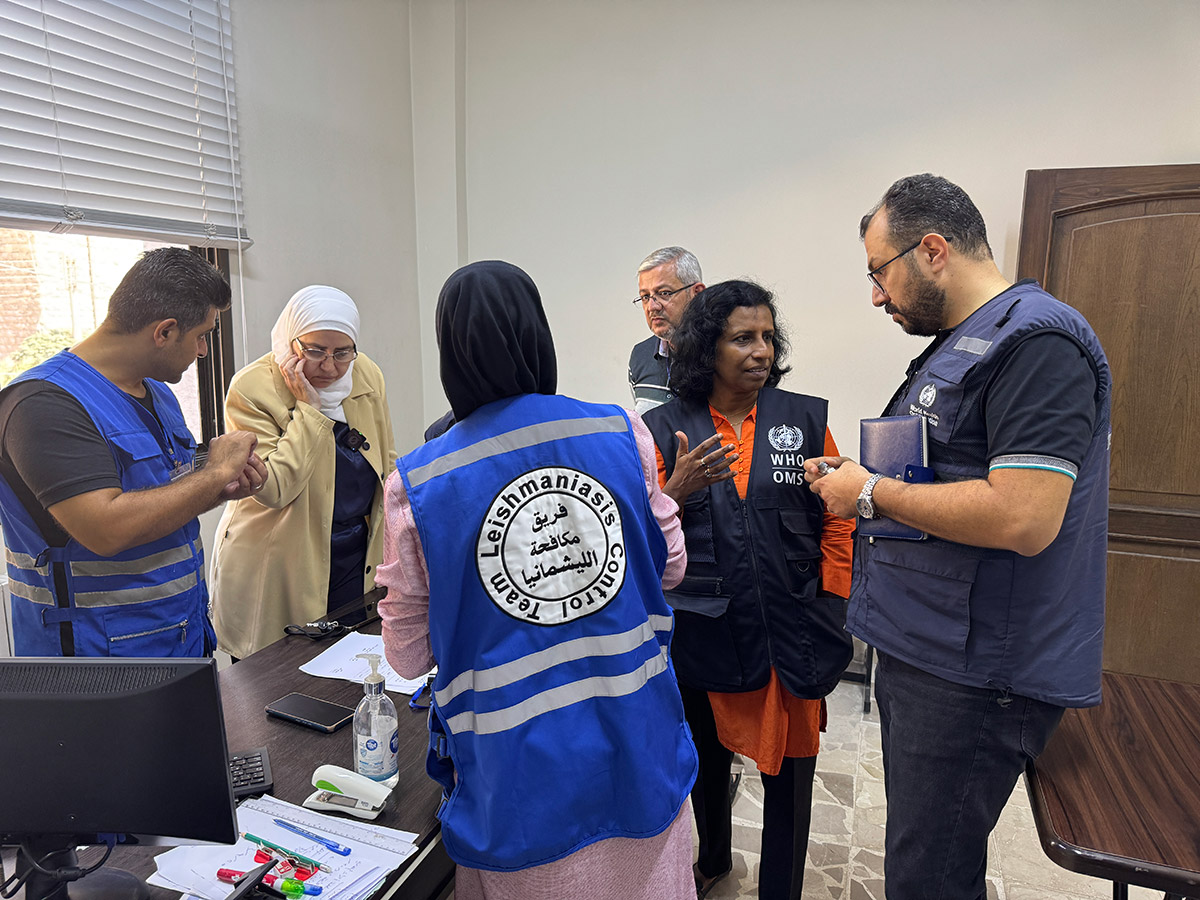 EMRO team visiting the newly established leishmaniasis treatment centre in Salah Al-Din, Aleppo, as part of WHO's efforts to expand healthcare access in Syria. Photo credit: @WHO Syria.24 October 2024 – On 3 October 2024, experts from the WHO Regional Office for the Eastern Mediterranean and the WHO Country Office concluded a mission in Syria to review, in collaboration with the Syrian Ministry of Health (MoH), the performance of the HIV, tuberculosis (TB), leishmaniasis and vector-borne disease control programs. The mission involved field visits to health facilities and directorates of health in Aleppo, Hama, Rural Damascus, and Damascus governorates to assess and evaluate the implementation and identify opportunities to expand access to quality health services and improve outcomes.
EMRO team visiting the newly established leishmaniasis treatment centre in Salah Al-Din, Aleppo, as part of WHO's efforts to expand healthcare access in Syria. Photo credit: @WHO Syria.24 October 2024 – On 3 October 2024, experts from the WHO Regional Office for the Eastern Mediterranean and the WHO Country Office concluded a mission in Syria to review, in collaboration with the Syrian Ministry of Health (MoH), the performance of the HIV, tuberculosis (TB), leishmaniasis and vector-borne disease control programs. The mission involved field visits to health facilities and directorates of health in Aleppo, Hama, Rural Damascus, and Damascus governorates to assess and evaluate the implementation and identify opportunities to expand access to quality health services and improve outcomes.
"Our goal is to ensure that communities in crisis have access to essential health services, especially for diseases worsened by conflict," said Dr Iman Shankiti, Acting WHO Representative to Syria. "Working with the Ministry of Health and partners, we are enhancing prevention, diagnosis, and treatment of TB, HIV, and leishmaniasis to better serve the most vulnerable."
Aleppo, home to nearly half of Syria’s leishmaniasis cases, is a key focus area. In collaboration with the MoH, WHO has opened a new treatment centre in Salah Al-Din and is upgrading the existing facility in Jab Al-Quba. Early detection and prompt treatment are central to WHO’s strategy, supported by vector control programs to reduce transmission.
With support from the Global Fund, WHO is working closely with the MoH to ensure that TB services are accessible, especially in remote and underserved areas. In Aleppo, WHO has helped rehabilitate the main TB centre, which supports 12 primary healthcare facilities and three laboratories across Aleppo and Rural Aleppo. A mobile TB clinic, one of five operating in Syria, serves displaced and vulnerable populations, reaching nearly 60,000 people each year.
WHO-supported voluntary counselling and testing centres provide free HIV services throughout Syria. In 2023, these centres conducted over 4,300 tests, identifying 45 positive cases. By early 2024, more than 440 people were receiving comprehensive care, including antiretroviral treatment (ARVs) and mental health and psychosocial support (MHPSS). All services are provided free of charge in all governorates through the MoH, also with Global Fund support.
With Syria’s healthcare system strained by the ongoing crises and displacement, WHO remains focused on delivering life-saving services for communicable diseases. This mission reflects WHO’s commitment to working closely with the Syrian Ministry of Health to expand access to care and improve health outcomes for those most in need.


